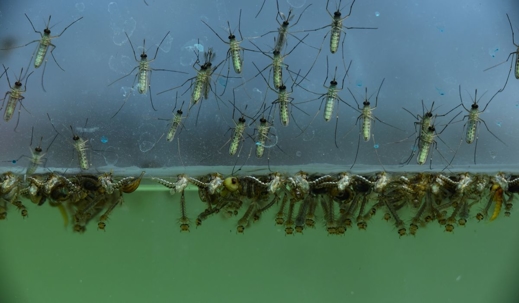How to Get Rid of Mosquito Larvae in South Florida
Mosquitoes thrive in Florida's warm, wet climate, making effective control essential. Targeting the larvae stage in standing water with larvicides—either natural predators or chemical agents—proves most effective.
This approach not only curbs the adult mosquito population but also helps prevent the spread of diseases, considering Florida's year-round breeding conditions.
Want to enjoy the outdoors without the annoyance of mosquitoes? Discover how different larvicide methods impact both the adults and larvae.
Key Takeaways
- Chemical larvicides with active ingredients like Spinosad and Methoprene target mosquito larvae and pupae stages.
- Home remedies such as vegetable oil and dish soap can effectively suffocate or drown mosquito larvae when applied to water surfaces.
- Biological controls like Bacillus thuringiensis israelensis (BTI) offer an ecologically friendly option to specifically target mosquito larvae without affecting other species.
- Preventative strategies include draining standing water and using mosquito-repellent plants like Citronella and Lavender to deter mosquitoes from laying eggs.
- Professional mosquito control solutions provide a comprehensive approach using EPA-approved methods and preventive measures to ensure long-term protection from mosquitoes.
How to Kill Mosquito Larvae in Florida
Eliminating mosquito larvae is crucial to controlling the mosquito population and reducing the spread of mosquito-borne diseases.
Different strategies for larval control are available, each with specific techniques and agents to effectively target larvae of different mosquito species.
Chemical Larvicides
Chemical mosquito larvicides are highly effective because they contain active ingredients that target the larvae and pupae stages of the mosquito life cycle. They prevent these stages from maturing into adult mosquitoes.
These larvicides often come in various forms, such as liquids, granules, and tablets, allowing for versatile application in different settings.
Here are common active ingredients you should find on the label:
Active Ingredients | Form | Specific Use |
Spinosad | Granules | Disrupts the nervous system of mosquito larvae. |
Methoprene | Tablets | Mimics insect hormone to prevent pupae development |
Temephos | Liquid | Applied in water storage containers to kill larvae. |
Natural and Home Remedies
Simple household items you wouldn’t expect can be natural home remedies to control mosquito larvae. They are sought after for their lower environmental impact and accessibility.
These home remedies can be spread at the surface of the water to suffocate mosquito larvae by creating a thin layer to prevent respiration.
Some home remedies you can find in the kitchen are:
- Vegetable Oil: Apply a thin layer over stagnant water to form a film that blocks larvae breathing.
- Dish Soap: Add a few drops into standing water to break surface tension and drown larvae.
- Apple Cider Vinegar: Mix with equal parts of water and pour into small water bodies to create an inhospitable environment for larvae.
- Diatomaceous Earth (DE): Apply a thin, light layer of DE dust where mosquito larvae are likely found, such as around the edges of ponds and other stagnant water sources.
How to Prevent Mosquito Larvae Development
.2406290225366.webp)
As homeowners in Florida, effectively preventing mosquito larvae is vital once you’ve successfully eliminated them on your property.
Killing adult mosquitoes alone with pesticides is often not enough. So, eliminating breeding sites that allow female mosquitoes to lay eggs is also essential.
Here are strategies to prevent mosquito eggs in standing water:
- Drain Standing Water: Regularly empty containers, such as flower pots, old tires, birdbaths, and rain barrels.
- Clean Gutters: Ensure gutters are free from debris to prevent water stagnation.
- Maintain Swimming Pools: Keep pools clean and chlorinated, even when not used.
- Fill Puddles: Fill in any areas in your yard that collect puddles after rain.
- Cover Water Sources: Use mosquito nets or lids to cover troughs and barrels to block access.
- Regular Inspections: Routinely check for new potential mosquito breeding grounds following rainfall.
- Install Mechanical Traps: Light traps can attract and kill adult mosquitoes but have a limited impact on larvae.
Consider Adding Mosquito-Repellent Plants
Another approach to discourage mosquito proliferation is the use of mosquito-repellent plants.
These plants emit fragrances that mosquitoes find unappealing, thereby reducing their presence. Here are potential plants to consider:
Mosquito-Repellent Plants | Placement Suggestion |
Citronella Grass | Borders of the property |
Lavender | Near seating areas and windows |
Marigolds | Entrance points and window boxes |
Basil | In pots around patios or the kitchen |
Catnip | Mixed throughout the garden |
Lemon Balm | Along pathways or in planters |
Professional Mosquito Control Solutions
When combating mosquito problems, professional mosquito control solutions offer a comprehensive approach far exceeding typical DIY methods, like bleach.
Here's how experts tackle the problem effectively:
- Expertise: Trained technicians understand where mosquitoes breed and how to stop them at the source.
- Safety: Professionals use EPA-approved insecticides safe for humans and the environment.
- Efficiency: They employ strategic methods that are more effective than retail products, like using growth regulators that prevent larvae from maturing.
- Prevention: Pest control services implement long-term solutions to prevent future infestations.
Should You Seek the Mosquito Experts?
If you find yourself in a buzzworthy battle of the backyards, you shouldn't hesitate to seek a professional pest control company (like us at Native Pest Management). The comfort and safety of your family and furry friends might just depend on it!
We’ll come equipped with an arsenal of tools and knowledge that the average Joe might not have in his shed. Assess the situation, find the sneaky spots you didn't even think to check, and lay down the law in Mosquito town.
